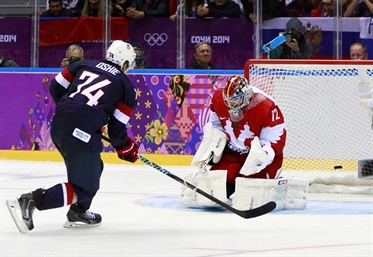Statement made
Statement made
U.S. wins classic against Russia in shootout

 SOCHI, RUSSIA - FEBRUARY 15: USA's T.J. Oshie #74 scores the 3-2 shoot-out game-winning goal against Russia's Sergei Bobrovski #72 during men's preliminary round action at the Sochi 2014 Olympic Winter Games. (Photo by Jeff Vinnick/HHOF-IIHF Images)
SOCHI, RUSSIA - FEBRUARY 15: USA's T.J. Oshie #74 scores the 3-2 shoot-out game-winning goal against Russia's Sergei Bobrovski #72 during men's preliminary round action at the Sochi 2014 Olympic Winter Games. (Photo by Jeff Vinnick/HHOF-IIHF Images)
The hobbling Datsyuk, who is playing through a knee injury, scored two goals for Russia and added a goal in the shootout, but the Americans’ two power-play tallies and the show-stopping performance by Oshie gave the Red, White and Blue two points and the inside track to the first place in the group.
The long-time rivals combined to give hockey fans the best game of the tournament by far, up to this point. High speeds, hard shots and shattering hits permeated the game from the first minute to the last, with the intensity level never dropping and the sellout crowd thoroughly entertained. With the opponents equally matched up and equally determined, a game like this simply had to end in the shootout.
"The game lived up to the hype,", said USA's Ryan Kesler. "The atmosphere in the building was good. It was a great game and a great ending."
“It was a good game. Very interesting," said Russia's Yevgeni Malkin. "Two, I think, best teams played and showed OK hockey. But shootouts is lucky.”
Russia made no adjustments to its roster in comparison with the game against Slovenia, save for the change in goal, where the 2013 Vezina Trophy winner Sergei Bobrovski took over for Semyon Varlamov. On the American side, two Pittsburgh Penguins defencemen, Paul Martin and Brooks Orpik, were joined in the same pairing, ostensibly to work against the Yevgeni Malkin line. As the U.S. head coach Dan Bylsma, also of the Pittsburgh Penguins, noted that these two have the most experience working against the top Russian start Malkin, Alexander Ovechkin and Alexander Syomin.
However, as it became immediately apparent, Bylsma was playing coy with the media and in the early going the “Pittsburgh pair” was mainly responsible for the Datsyuk line. Unlike his Russian counterpart Zinetula Bilyaletdinov, who rolled his four five-man units, Bylsma played matchups, usually trying to get his best defensive players in against the two top Russian lines.
The game got off to an explosive start, with both teams playing an up-tempo, hard-hitting game. It didn’t take long for the tempers to flare, either. Bobrovski came up with the game first big save, a nice trapper stop on a Ryan Callahan slap shot, and altercation in the crease immediately followed. Callahan had many words to say to Russia’s defenceman Yevgeni Medvedev while Syomin and David Backes were busy trying to remove each other’s helmets. Clearly, there was no love lost between these opponents.
Russia held the advantage in possession and chances throughout most of the first period. Working on the game’s first power play, Malkin forced Jonathan Quick to make a nice kick save on a screened shot. Seconds later, Malkin set up Kovalchuk with a wide open shot in the left circle, but the SKA St. Petersburg star whiffed on the puck. Another shot, a slapper from the blue line by Ovechkin, bounced wide but hit and momentarily incapacitated a linesman.
Everything in this game was fast, hard-hitting and uncompromising, just like advertised.
"Obviously, they’re the host country and there’s a lot of pressure on them," said Quick. "They’re a great team and they’re going to keep playing and they’ll be there toward the end. We know that."
The Americans’ best chances of the first period came in its dying moments, with Russia killing its first penalty of the game. Ryan Kesler, parked securely in Bobrovski’s crease, created all kinds of havoc around the net and the Russian goaltender had to make several spectacular stops to preserve the 0-0 tie.
In the second period, it was the Russians’ turn to give the opposition a few anxious moments on the penalty kill. Ovechkin, working out of his familiar stop in the left face off-circle, unleashed a couple of booming shots that would’ve surely beaten Quick if they went on net. Another shot hit Kesler who had to leave the game and go back to the dressing room for a few minutes.
It was the Magic Man, Pavel Datsyuk, who finally broke the tie and he did it in his signature, flowing, almost intangible style. Datsyuk got a long pass in the neutral zone, effortlessly splitt the defense and shot it hard and low, under and off the right post. Coincidentally, this happened shortly after the Russian President Vladimir Putin took his seat at the Bolshoy Ice Dome.
With the crowd of 11,678 thrown into a frenzy of “RAS-SEE-YA” chants, Russians kept right on pressing, generating more and more chances off of quick rushes by Ovechkin, Malkin and the spectacular and powerful youngster Valeri Nichushkin.
America’s big break came on a power play, after Alexander Radulov took a rather unnecessary penalty with a vicious cross-check on Dustin Brown. If Russia’s goal was pure Datsyuk, the equalizer was pure North America, as the U.S. power play unit went hard to the net, pushing through a rather soft resistance by the Russian penalty killers. James van Riemsdyk, forcing his way through to the crease, dished off a pass to Cam Fowler, who shoveled the puck into the net pas the outstretched glove of the sprawled Bobrovski.
With both defences and goaltenders playing extremely well, the penalties became the story of the game. In the third, Russia had another great chance on the power-play, but Malkin’s one-timer was stopped in a spectacular fashion by Quick, who went on full splits to get the puck with his pad.
That was just the beginning. Another bad penalty by Radulov (this time, he hooked Patrick Kane in the neutral zone) resulted in a go-ahead goal by the Americans. Kane fed a perfect pass to the left post where Joe Pavelski one-timed it into the net, immediately quieting the stunned pro-Russian crowd.
Radulov did redeem himself about three minutes later, when Russians were up a man after a Brown kneeing penalty. The big CSKA Moscow forward made a perfect screen in front of Quick and Datsyuk’s shot slipped right under the goalie’s pad.
Energized, the Russians took the game over for the next few minutes, throwing wave after wave of fast rushes at the U.S. net. Datsyuk’s perfect pass to Kovalchuk culminated in a shot that beat Quick but struck the post. Seconds later, however, Fyodor Tyutin’s thunderous blast from the blue line went in under the crossbar to the delirious happiness of the stands.
The celebration was short-lived, however, as Quick rushed to the referees pointing at the left goalpost that hung ever so slightly off the mooring. After reviewing the play, the referee spread his arms in the “no-goal” gesture as the fans’ emotions took a quick turn to the unbridled fury.
"I think, Quick may have pushed the net off on purpose," said Russia's defenceman Slava Voinov. "I know him and he sometimes does these things. But we shouldn't have let this decide the game. We need to score more."
In overtime, the indomitable Datsyuk had a shorthanded opportunity, after Quick mishandled his dump-in, but the goalie was able to recover and make a save. In the third minute of the extra frame, Pavelski sent Kane off to a clear breakaway, but Bobrovski closed the five-hole to deny one of the NHL’s most dangerous scorers. Goalie heroics continued through the last minute of play, with Qiuck stopping a hard shot by Ovechkin from the right circle, and Bobrovski once again turning away Kane in close quarters.
It was up to the “hockey lottery” to determine the winner of this Olympic classic.
Oshie shot first for the Americans and beat Bobrovski through the five-hole after a very deliberate approach to the net. Malkin went high glove-side, but missed. After van Riemsdyk’s attempt was turned away by the goalie’s blocker, Datsyuk had a chance to be Russia’s hero again, but his deke to the backhand didn’t fool Quick who caught the puck in his glove. With the opportunity to win it, Pavelski went for a fancy stop-and-go move, but couldn’t get the puck up over Bobrovski’s pad, and Kovalchuk tied it for Russia with a simple glove-side shot just inside the post.
In the sudden-death round, it was the Oshie show.
"[I felt the pressure] a little bit," he said afterwards. "I think once the puck hits your stick and you start skating down the ice, it’s just you and the goalie and you block everyone else out. I was fortunate enough to keep him guessing and Quickie slammed the door on them."
In the eighth round of the shootout, after Oshie had scored on three of his previous five attempts, the exasperated crowd saw Kovalchuk fail to beat the sprawling Quick. This was one chance too many given to Oshie, who became America’s unexpected hero with a hard wrist shot right between Quick's pads.
"I think T.J. Oshie is going to be a household name after that display he put on," said USA forward David Backes. "Kids will be out on the pond in Minnesota throwing a five-hole on the goalie three or four times in a row. He's been great these first two games, helping us win both of them."
Both teams will be back in action on Sunday at 16:30, with Russia taking on Slovakia at the Bolshoy and USA going up against Slovenia at the Shayba Arena.
Back to Overview











































